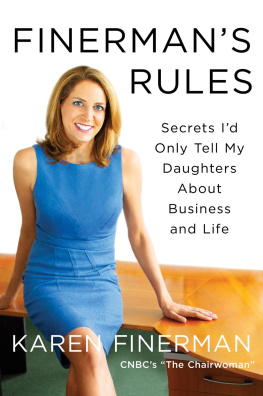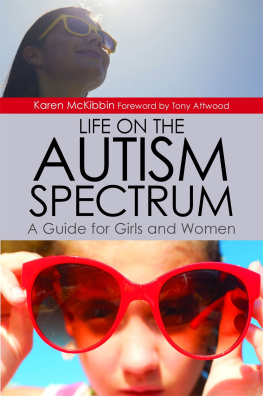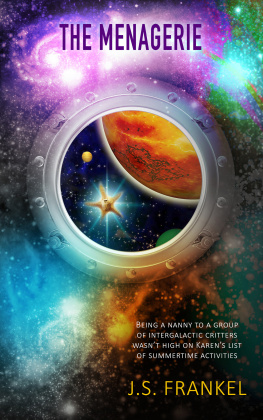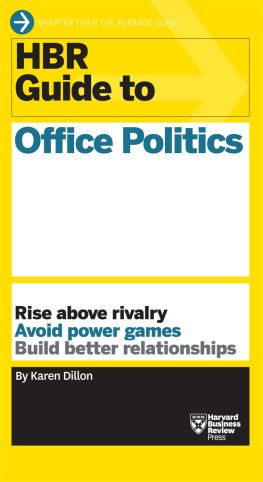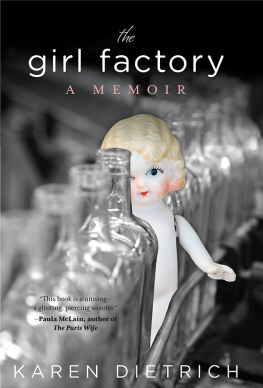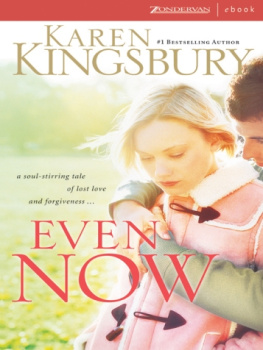I was raised a Calvinist. You might think you know what that means, but let me explain it the way my mother preached it to my three sisters and me back when we were at home: I buy my girls Calvin Klein clothes, so thats all they know. Then when they graduate from college, they have to figure out how to pay for them themselves.
Thats itthats the philosophy. I cant tell you how many people I meet who think Calvinism is something else entirely. It worked for us.
Wendy, the oldest, went on to be a movie producer of such films as The Devil Wears Prada, Stepmom, and Forrest Gump, for which she won an Oscar. Unlike many people in the movie business, Wendy knew no one to help her get started. Through sheer will, she managed to find a job working for Steve Tisch, the producer. And it was only through her relentless perseverance and ambition that she finally got the book Forrest Gump made into one of the most successful films of all time.
My brother Mark, the second oldest, was spared the Calvinist lecture. Yet he still managed to become a real estate financier of such success and renown that I can scarcely come across someone in the real estate business who doesnt know him and tell me with a smile, I love your brother. After a brief career as a professional tennis player on the pro circuit, Mark realized he could teach others how to play tennis to make money, or he could learn business skills and teach himself how to make money.
He went from teaching a real estate king how to hit topspin to realizing he could be the real estate mogul himself, and he already knew how to play tennis. He became the right-hand man to two big real estate players, first at Nomura and then Credit Suisse, before becoming the number-one man himself in the CMBS business (commercial mortgage-backed securitiesdont worry if you dont know what that is), financing office towers and shopping mallsand he went higher from there. Yet he is still, at heart, the boy I grew up with. Even though he lives in a grown-up house in grown-up Greenwich, Connecticut, hes like Tom Hanks in Big. Mark has every toy imaginablecars, horses, pinball machines, tree houses, go-carts, vegetable gardens, an indoor basketball court, candy machinesand he still thinks cartoons are funny.
Then theres me, the tomboy, nerd, and hedge fund cofounder.
And pulling up the rearour two little sisters. First is Leslie, who followed my footsteps into finance after graduating from Berkeley and headed to Morgan Stanley. She then made the leap to become an analyst at a large credit hedge fund. Leslie recently took the road less traveled (in our family) and became a stay-at-home mom (for now). Leslie is the arbiter of cool in our family, the master of style. She can renovate an apartment and act as a general contractor even when nine months pregnant.
Last is Stacey, the youngest, maybe the smartest of us all, who was hired out of Wharton by Salomon Brothers, then got plucked away by RBS, and then after the 2008 market crash was hired by Goldman Sachs. After a breakup with a boyfriend, she decided to channel the energy left over after her day job to become a world-class Ironman competitor. She transformed herself into an extraordinary endurance machine. She doesnt just focus on finishing in the allotted 17 hours. Shes looking to improve on her personal best of 12 hours, for the 2.4 mile swim, the 112 mile bike ride, and the 26.2 mile marathon.
Funnily, we all made our way from laid-back Southern California to New York City and its environs. It was here that we hoped we would find our success.
Instilling in her children her own brand of Calvinism, our mom didnt subscribe to the Happiness-Is-a-Warm-Puppy, Free-to-Be-You-and-Me parenting styles that were so prevalent when we were growing up. I think she may have truly believed that being only warm and loving to your children conveyed that you accepted them as they were, as opposed to putting forth the effort to make them better. She always let us know that we couldand shouldreach for more, with our academics, sports interests, and our ambitions. If you had asked my mother, Would you rather your children be successful or happy? she would have answered, without the slightest bit of hesitation, Successful. How can you be happy if youre not?
Growing up, that message stuck with me. It was so imbedded in my thoughts that I dont ever remember when I learned it. It just was. Any of my friends who spent time in our kitchen (the neighborhood meeting place) heard the same message. In the way other mothers would have said, Did you get enough to eat? or Any crushes these days? my mother would say to some of my seemingly less ambitious friends, How are you going to support yourself with no plan?
As a teenager, rather than setting myself on a course to pursue fame (quite common growing up in L.A., the entertainment capital of the world), happiness, fulfillment, and spiritual enlightenment (also quite common), I skipped right on to trying to be successful. Lets just get on with it, I felt. Onward became my motto.
I wanted to get out in the world, have a great job, make my mark, and see how far I could go. And I wanted to make good on the philosophy my mother drilled into us with all the subtlety of a Lady Gaga performance. I got it loud and clear. I would need to succeed, and then I could possibly be happy.
* * *
And so I set about a career with a goal to make money, be independent, and make a success of myself on Wall Street. But as I did that, I realized that what I learned on Wall Street could be used anywhere, and in any part of my life. Its OK to have a plan, to invest in your futurefor your financial security, your love life, your personal fulfillment, and even your happiness. To have personal happiness as a stated goal doesnt detract from it if you get there. Serendipity is nice, but hoping for luck and the magic of happenstance shouldnt be an excuse for a lack of proactivity. I had to learn for myself that waiting isnt a life plan.
In my journey to succeed and find happiness, Ive accumulated a fair amount of wisdom as I saw what made some people quite successful, while others, who were far more talented, got stuck, paralyzed, or repeated the same mistakes over and over. I saw, too often, how women consistently got in their own way. Thats what this book is about. Its my story and the lessons Ive learnedwith some wisdom from friends, siblings, and colleagues mixed inabout how I knew what I wanted but needed to learn to get out of my own way. Since the steps to success (in business and life) didnt come naturally to me (and really, look at the messes around you; do they for anyone?), I had to try, then fail and try again. I had to come up with principles and rules to add to the Calvinist ethic I got from my mother. And its not easy, because people dont tell you what to expectespecially women, who believe they are not supposed to say out loud some of the things that other women really need to hear. I dont care if what I have to say is PC or not. As I started writing this book, I realized my children didnt know and hadnt even considered what I thought I had already so thoroughly engrained in them, which is that they will need to be independent and self-reliant. They will need to be in charge of their lives. These are things they need to know.
What I wanted was very clear to mesuccess. To meand I hope for youthat does mean money. I want you to have enough money and the independence that money affords so it isnt a force determining what you can and cant do, or who you can and cant be. Plus, having money is fun. I remember the absolute, joyous freedom I felt when I first went to college: I had no bedtime, no curfew, no rulesI loved it. I was in charge. I couldnt believe I didnt have to answer to anyone.

